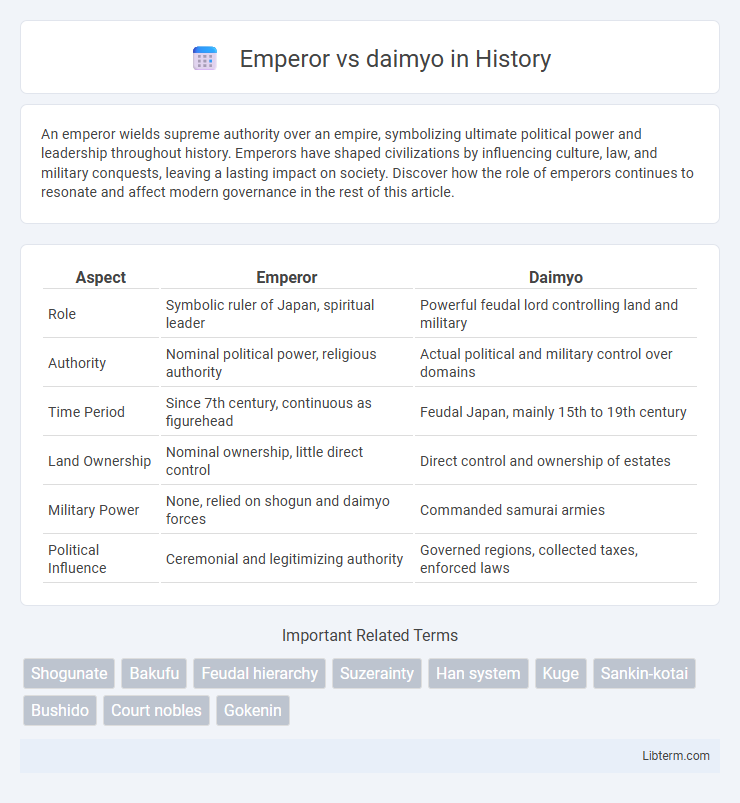An emperor wields supreme authority over an empire, symbolizing ultimate political power and leadership throughout history. Emperors have shaped civilizations by influencing culture, law, and military conquests, leaving a lasting impact on society. Discover how the role of emperors continues to resonate and affect modern governance in the rest of this article.
Table of Comparison
| Aspect | Emperor | Daimyo |
|---|---|---|
| Role | Symbolic ruler of Japan, spiritual leader | Powerful feudal lord controlling land and military |
| Authority | Nominal political power, religious authority | Actual political and military control over domains |
| Time Period | Since 7th century, continuous as figurehead | Feudal Japan, mainly 15th to 19th century |
| Land Ownership | Nominal ownership, little direct control | Direct control and ownership of estates |
| Military Power | None, relied on shogun and daimyo forces | Commanded samurai armies |
| Political Influence | Ceremonial and legitimizing authority | Governed regions, collected taxes, enforced laws |
Origins and Historical Context of Emperor and Daimyo
The Emperor of Japan originated as a divine ruler descended from the sun goddess Amaterasu, symbolizing spiritual and political unity since ancient times. Daimyo emerged during the feudal era, particularly in the Kamakura and Muromachi periods, as powerful regional lords controlling vast landholdings and samurai armies. While the Emperor maintained ceremonial authority, daimyo exercised practical military and administrative power across Japan's provinces.
The Role of the Emperor in Japanese Society
The Emperor of Japan symbolizes the unity and continuity of the nation, holding a largely ceremonial and spiritual role rooted in Shinto traditions. Unlike the daimyo, who exercised regional military power and governed their domains during the feudal era, the Emperor's influence remained primarily symbolic, serving as a cultural and religious figurehead. The Meiji Restoration shifted political authority from the daimyo to the Emperor, establishing a centralized state while preserving the Emperor's status as the supreme sovereign.
The Rise and Influence of the Daimyo Class
The daimyo class rose to prominence during Japan's feudal period, wielding significant military and economic power through control of vast landholdings and samurai armies. Their influence often rivaled that of the emperor, who held symbolic authority but lacked direct political control. As regional warlords, daimyo shaped the political landscape by engaging in territorial conflicts and alliances that ultimately redefined Japan's governance structure.
Political Power: Emperor vs Daimyo
The emperor of Japan held symbolic and religious authority, embodying the nation's unity and divine legitimacy but wielded limited direct political power during feudal periods. Daimyo, powerful regional lords, exercised substantial military control and governed their domains autonomously, influencing local politics, economy, and law enforcement. The balance of power favored daimyo in practical governance, while the emperor's role remained largely ceremonial and spiritual.
Religious and Cultural Significance
The Emperor of Japan held supreme religious status as the direct descendant of the sun goddess Amaterasu, symbolizing divine authority and embodying Shinto spiritual traditions. Daimyo, as powerful regional lords, supported and propagated local Buddhist temples and Shinto shrines, reinforcing their political legitimacy through religious patronage. The intertwining of the Emperor's sacred role with the daimyo's cultural influence underscored the fusion of spiritual devotion and governance in medieval Japanese society.
Military Authority and Control
The emperor held symbolic military authority as the spiritual and cultural figurehead of Japan, but real military control resided with the daimyo, powerful regional lords who commanded their own private armies of samurai. Daimyo exercised direct control over soldiers, fortifications, and local governance, effectively functioning as autonomous warlords during the feudal period. This decentralized military power structure allowed daimyo to wield significant influence and contest one another for dominance, limiting the emperor's practical command over armed forces.
Land Ownership and Economic Power
Emperors held symbolic authority as the nominal rulers of Japan, but actual land ownership and economic power resided primarily with the daimyo, regional lords who controlled vast estates and agricultural production. Daimyo managed land distribution, collected taxes, and maintained private armies, giving them significant autonomy and influence over local economies during the feudal period. While the emperor's status reinforced political legitimacy, the daimyo's control of land and resources was the foundation of their real power and wealth.
Key Conflicts and Power Struggles
The key conflicts between the Emperor and daimyo revolved around the struggle for political authority during Japan's feudal period, where the Emperor held symbolic sovereignty while daimyo controlled regional military power. Daimyo frequently challenged imperial authority by building autonomous domains and maintaining private armies, leading to power struggles exemplified in periods like the Sengoku era. The fragmentation of power resulted in ongoing battles for dominance, with daimyo often overshadowing the Emperor's influence until the eventual unification under the Tokugawa shogunate.
Impact on Feudal Japan’s Social Hierarchy
The Emperor in feudal Japan held a largely symbolic and religious role, embodying the divine authority but wielding minimal political power, which reinforced the social hierarchy's spiritual foundation. In contrast, the daimyo were powerful territorial lords who exercised significant military and economic control over their domains, directly influencing the social and political structure of the samurai class and peasantry. The interplay between the Emperor's ceremonial status and the daimyo's practical governance shaped the rigid feudal hierarchy that defined social relations and governance during this period.
Legacy of Emperor and Daimyo in Modern Japan
The legacy of the Emperor in modern Japan is deeply rooted in cultural unity and national identity, symbolizing continuity and spiritual authority despite the constitutional limitation of political power since the Meiji Restoration. Daimyo, the powerful feudal lords of Japan's Edo period, influenced regional governance and economic development, with their former domains often evolving into modern prefectures that retain historical and cultural significance. The interplay of imperial symbolism and daimyo heritage continues to shape Japan's social structures and cultural traditions, reflecting a fusion of centralized reverence and local autonomy in contemporary society.
Emperor Infographic

 libterm.com
libterm.com